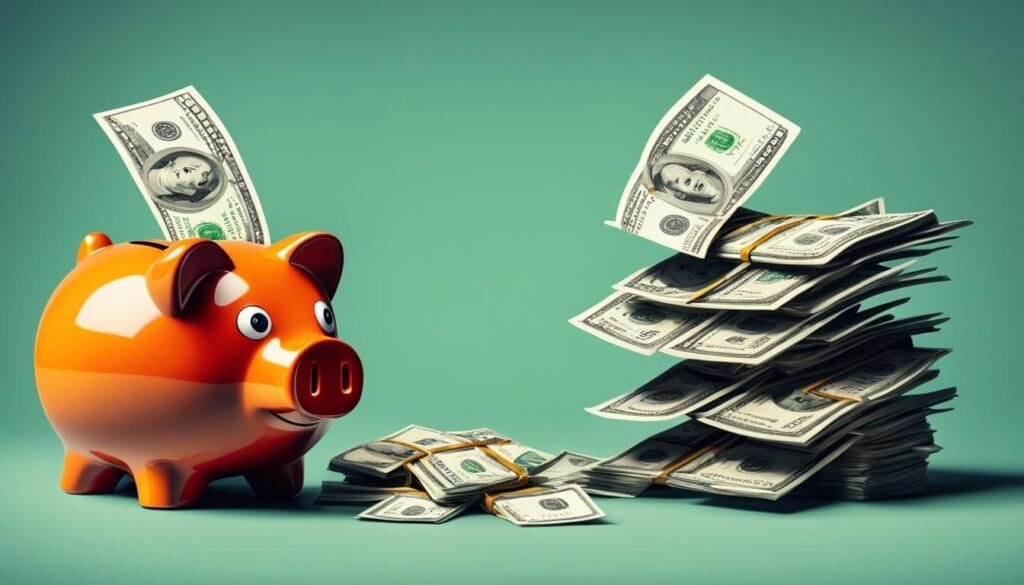During an economic downturn, businesses need to implement effective strategies to safeguard their operations and ensure stability in challenging times. While traditional economic indicators provide valuable insights, there are also unconventional signs that can indicate an impending recession or its impact on various industries. These unusual indicators include trends in lipstick sales, men’s underwear sales, tipping practices, dating habits, hair salon services, company fridges, luxury watch sales, and Super Bowl winners. These quirky signals can provide unique perspectives on the state of the economy and help businesses prepare for potential challenges ahead.
Key Takeaways:
- Economic downturns require businesses to implement effective strategies for resilience and recession planning.
- Unconventional indicators, such as lipstick sales and men’s underwear sales, provide unique insights into economic conditions.
- Tipping practices and changing dating habits can reflect consumer behavior during challenging economic times.
- Hair salon services often experience shifts in demand during economic downturns, highlighting the need for businesses to adapt their offerings.
- Businesses that embrace adaptive strategies and anticipate changing market conditions are more likely to achieve long-term stability and success.
The Lipstick Effect: A Barometer of Economic Downturn
The “lipstick effect” is a phenomenon that occurs during economic downturns when consumers prioritize purchasing less expensive beauty products, such as lipstick, over higher-priced luxury items. This theory, proposed by economist Juliet Schor, highlights how financial constraints impact consumer behavior. When faced with limited disposable income, individuals tend to choose more affordable beauty options like lipstick, as it provides a sense of indulgence without breaking the bank.
The lipstick effect was observed during the post-9/11 recession when Estée Lauder reported a surge in lipstick sales despite the economic downturn. This finding suggests that even in challenging times, consumers still seek ways to maintain a sense of normalcy and treat themselves to small luxuries.
By monitoring lipstick sales, beauty industry experts and analysts can gain valuable insights into consumer sentiment and spending patterns during economic downturns. Lipstick sales serve as a unique barometer of economic health, indicating the degree of financial strain individuals are experiencing and the shifts in consumer behavior.
Why Lipstick?
The appeal of lipstick during economic downturns can be attributed to several factors:
- Affordability: Lipstick is relatively more affordable compared to other beauty products, making it an accessible indulgence for consumers on tight budgets.
- Enhancing self-image: Lipstick is often seen as an instant confidence booster, allowing individuals to feel put together and polished even during challenging times.
- Boosting mood: The act of applying lipstick can have psychological benefits, as it can uplift one’s mood and provide a sense of normalcy amidst economic uncertainties.
Furthermore, the lipstick effect has implications beyond the beauty industry. It serves as an economic indicator with potential implications for various sectors, including retail, fashion, and consumer goods.
The Men’s Underwear Indicator
Former Federal Reserve Chair Alan Greenspan proposed an intriguing theory that sheds light on consumer behavior during difficult economic times. According to Greenspan, men’s underwear sales can serve as an unconventional indicator of financial pinch and cost-cutting measures. The premise behind this theory is that when individuals face economic challenges, they tend to postpone replacing worn-out items such as underwear.
In support of Greenspan’s theory, The Guardian reported a decline in men’s underwear sales in 2002 when the global economy was experiencing a downturn. Hanesbrands, a leading underwear brand, saw its stock prices fall by a significant 50% year on year. This decline in sales and market performance further emphasizes the impact of economic conditions on consumer spending habits.
Understanding the Men’s Underwear Indicator
The Men’s Underwear Indicator suggests that when people are feeling the financial pressure, they prioritize essential expenses over discretionary ones. Underwear, considered a necessity, may be seen as a non-urgent purchase that can be postponed to save money in the short term. By monitoring trends in men’s underwear sales, economists and businesses can gain valuable insights into the state of the economy and anticipate changing consumer behaviors.
Implications for Businesses
The Men’s Underwear Indicator highlights the importance for businesses to closely track consumer spending habits and adapt their strategies accordingly. During economic downturns, it becomes crucial for companies to identify cost-cutting measures that align with consumer priorities. By understanding the impact of financial hardships on purchasing decisions, businesses can make informed decisions about pricing, product offerings, and marketing strategies.
Moreover, being aware of unconventional indicators like men’s underwear sales can help businesses forecast demand and plan ahead. By recognizing the signs of a financial pinch, companies can implement proactive measures to maintain resilience in the face of challenging economic conditions.
By staying vigilant and responsive to the fluctuations in consumer behavior, businesses can position themselves strategically, ensuring both short-term survival and long-term success.
Unconventional Tipping Practices
Tipping practices can provide unique insights into economic downturns. A fascinating example is the tipping trends observed among exotic dancers. During prosperous times, these performers tend to receive generous tips. However, when economic hardships hit, their earnings decline as consumers cut down on discretionary spending.
The Guardian interviewed a dancer who shared how her income was halved in December compared to the same period the previous year. This significant decrease in tips serves as an indicator of a decrease in overall consumer spending. As a result, tipping practices among exotic dancers can act as a distinctive barometer for identifying recession indicators.

Changing Dating Habits
In times of economic uncertainty, individuals often seek out cost-saving measures in various aspects of their lives, including dating. With limited disposable income, traditional dating activities like going to bars and clubs may become less feasible for many people. As a result, online dating apps have seen a surge in activity during recessions, providing an alternative and more affordable way to meet potential partners.
In November 2022, Match Group, the parent company of popular dating apps Tinder and Hinge, reported a 2% increase in paying subscribers. This data suggests a shift towards online dating platforms as individuals adapt to the economic downturn. By leveraging these apps, users can connect with others from the comfort and convenience of their own homes, without incurring the expenses associated with traditional dating.
Online dating apps offer a variety of benefits during recession dating:
- Greater cost-efficiency: With online dating, individuals can avoid the expenses typically associated with traditional dating, such as buying drinks or meals at restaurants.
- Convenience and flexibility: Users have the freedom to browse profiles and interact with potential matches at their own pace and convenience, eliminating the need for expensive outings.
- Wider reach: Online dating apps provide access to a larger pool of potential partners, expanding the chances of finding a compatible match.
- Filtered preferences: Users can customize their search criteria to find individuals who align with their specific requirements, saving time and potential disappointment.
The increasing popularity of online dating apps during economic downturns highlights the adaptability of individuals in navigating challenging times. By embracing these cost-saving measures, individuals can maintain their social lives while being mindful of their financial circumstances.
Quote:
“During recessions, people often seek creative ways to continue dating without breaking the bank. Online dating apps offer a convenient and cost-efficient solution that allows individuals to meet new people while saving money.”
– Dating Expert, Jessica Allen

| Online Dating Apps vs. Traditional Dating | Online Dating Apps | Traditional Dating |
|---|---|---|
| Cost | Less expensive; no need for expensive outings or meals | Can be costly; expenses include drinks, meals, events |
| Convenience | Allows users to browse and interact at their own pace | Dependent on availability and schedules |
| Reach | Access to a larger pool of potential partners | Limited to local venues and social circles |
| Filtered Preferences | Customizable search criteria to find compatible matches | Relying on chance encounters and introductions |
Adapting Hair Salon Services
Economic downturns often result in changes in consumer behavior, including a shift towards embracing natural hair colors. When faced with a recession, adults are less likely to opt for expensive salon-quality dye treatments and instead choose to embrace their natural dark or grey shades. This trend reflects a cost-cutting measure as individuals prioritize spending less on maintaining their hair during challenging economic times.
The beauty industry, particularly hair salons, experiences a significant shift in demand for services during recession periods. To meet the changing preferences of their clientele, hair salons need to adapt their offerings and cater to the increased demand for natural hair color treatments.
It’s crucial for hair salons to understand the recession beauty trends and align their services with the changing needs of the consumer base. By offering high-quality natural hair color treatments, salons can ensure that they remain relevant and continue to attract customers even during economic downturns.
While salon-quality dye treatments may be temporarily less popular during recessions, it’s essential for hair salons to provide alternative services that meet the demands of cost-conscious individuals. By offering natural hair color options and providing expert advice on maintaining and enhancing natural shades, hair salons can position themselves as trusted providers of recession-friendly beauty solutions.
Furthermore, salon owners can optimize their marketing strategies by highlighting the benefits of natural hair color treatments, such as lower maintenance costs and reduced exposure to potentially harmful chemicals found in traditional dyes. This approach not only appeals to budget-conscious consumers but also aligns with the growing trend towards sustainable and environmentally friendly beauty practices.
As the beauty industry continues to evolve and adapt to recessionary challenges, hair salons that embrace the natural hair color trend and offer salon-quality treatments catered to this demand are more likely to thrive. By staying attuned to recession beauty trends and consistently delivering exceptional customer experiences, hair salons can position themselves as reliable partners in enhancing and maintaining natural hair beauty.
| Salon Adaptation Strategies | Benefits |
|---|---|
| 1. Offer natural hair color treatments | – Appeal to cost-conscious consumers – Align with sustainable beauty trends |
| 2. Provide expert advice on maintaining natural shades | – Build trust and loyalty – Meet the needs of the growing natural hair movement |
| 3. Optimize marketing strategies around the benefits of natural hair color | – Attract recession-conscious consumers – Appeal to environmentally conscious individuals |
By implementing these adaptation strategies, hair salons can navigate economic downturns and position themselves as resilient players in the beauty industry.

Can you explain some unique strategies for dealing with economic downturns?
During bizarre economic downturns, businesses can explore unique strategies to stay afloat. Diversifying products or services, tapping into new markets, and negotiating flexible payment terms with suppliers can help mitigate the impact. Additionally, offering unique incentives to retain customers and seeking unconventional partnerships can also provide a competitive edge.
Conclusion
Economic downturns necessitate the adoption of adaptive business models to navigate the challenges and ensure economic resilience. In addition to traditional economic indicators, businesses can gain valuable insights from unconventional indicators that provide unique perspectives on consumer behavior.
Understanding the impact of economic downturns on various industries is crucial for implementing effective recession strategies. This includes proactive recession planning, implementing cost-cutting measures, strategic budgeting, and revenue diversification to safeguard business operations.
Businesses must possess the ability to adapt and pivot in the face of economic challenges to achieve long-term success and stability. By embracing adaptive strategies and being attentive to shifting market conditions, businesses can position themselves to withstand economic downturns and thrive in an ever-changing business landscape.
FAQ
How can businesses prepare for an economic downturn?
Businesses can prepare for an economic downturn by implementing effective recession planning, business resilience strategies, and risk management. This includes strategic budgeting, cost-cutting measures, and revenue diversification.
What are some unconventional indicators of an economic downturn?
Unconventional indicators of an economic downturn include trends in lipstick sales, men’s underwear sales, tipping practices, dating habits, and hair salon services. These quirky signals provide unique perspectives on the state of the economy and can help businesses prepare for potential challenges.
How can lipstick sales be an indicator of an economic downturn?
Lipstick sales can be an indicator of an economic downturn because people tend to purchase more lipstick when they can’t afford more expensive beauty products. This phenomenon, known as the “lipstick effect,” reflects the impact of financial constraints on consumer purchasing decisions.
Why do men’s underwear sales indicate an economic downturn?
Men’s underwear sales can indicate an economic downturn because individuals are more likely to delay replacing worn-out items like underwear when facing financial challenges. A decline in men’s underwear sales reflects the impact of economic conditions on consumer spending habits.
How do tipping practices provide insights into economic downturns?
Tipping practices can provide insights into economic downturns as they reflect the discretionary income available to individuals. For example, exotic dancers often receive better tips when times are good, but their earnings decline during economic hardships, indicating a decrease in overall consumer spending.
How do dating habits change during an economic downturn?
Dating habits can change during an economic downturn as individuals seek cost-saving measures. Online dating apps have seen increased activity during these periods when singles have less disposable income to spend on traditional dating activities like going to bars and clubs.
How do economic downturns impact hair salon services?
Economic downturns can impact hair salon services as individuals opt for cost-cutting measures. This includes a shift towards natural hair colors instead of expensive salon-quality dye treatments. The beauty industry, particularly hair salons, experiences a change in demand for services during these times.

